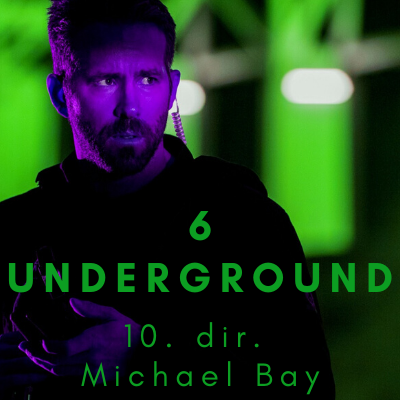
Yeah, look, I love Michael Bay films. I do! I’m a huge fan of Pain & Gain, and have been a vocal supporter of the Transformers films, so when 6 Underground blasted onto Netflix with the same energy and insanity that existed in Pain & Gain, and the excessive chaos that Bay calls ‘action’ from the Transformers films, well, I was in heaven. There is simply no action director working at the level that Bay is working at today: balls to the wall, earnestly offensive, meticulously over-the-top set pieces make up the body of 6 Underground, with Bay’s dislike for humans being so clear here that he slaps a woman in the face with a pigeon, has a slow-mo shot of a man getting hit with a grenade, and an excessive amount of squibs adding to the ever growing body count. Manic, delirious, breathy and frenetic. I can appreciate why many dislike his work, but goodness, Michael Bay is, oddly enough, the kind of director I can’t help but admire.

Another short film, this time harking from South Australia. I caught this short at Perth’s Revelation Film Festival when it played before Chained for Life, and honestly, I haven’t been able to stop thinking about it. This is a masterful slice of storytelling, weaving the same kind of narrative aesthetic that thrived in The Guilty – here, a first time mental health phone service worker is thrown in the deep end when she has to help a frustrated and suicidal man. The camera focuses solely on actress Caithlin Ologhlen who presents being out of her depth, yet eager to help, in such a pure manner. When end of year lists roll around, we tend to forget about short films because, well, they’re often seen less than feature films, but when there’s a short as great as Call Connect. in the world, it deserves the recognition on a list like this.

Selina Miles documentary about photojournalist Martha Cooper should be a template for other documentaries going forward. Edited to reflect the energy and vibrancy of the graffiti that Cooper photographs, Martha: A Picture Story feels at one with the subject it’s exploring, with Selina Miles rejecting any traditional ‘talking heads’ aesthetics that many other directors would have gone with. Miles’ art background comes in handy when we’re presented with the essential ideas related to Martha Cooper’s work and career. This is fresh, vibrant, exciting, and inviting filmmaking – one that extends a hand to the viewer and offers everyone the chance to walk down a different part of history that is rarely explored. One of the finest Australian documentaries in years.

Antonio Banderas delivers the finest performance of the year – and his career – in Pain and Glory. Here, he honours his longtime colleague and friend, Pedro Almodovar by presenting a skewed version of his life. In many ways, Pain and Glory works to reaffirm the filmography of Almodovar, delivering a culmination of decades worth of themes of motherhood, women, men, love and life, and honouring all of them completely in this tender and loving film. I’ve long struggled to appreciate Almodovar’s work on the same level as everyone else does, but with Pain and Glory I feel my eyes have been truly opened and I’m able to approach his films again with a newfound belief and understanding. I can’t wait to revisit his work with the memories of Pain and Glory in mind.

This dogumentary about the iconic dog that featured in the classic Aussie film Red Dog feels like a miracle. The Red Dog series continues in new and invigorating ways, and once you’ve seen this third entry, it feels like a no-brainer that Aaron McCann and Dominic Pearce would be tasked with telling this story. Fantastically hilarious, genuinely joyous, and ever adoring for the canine friends that we find in our lives, Koko: A Red Dog Story is a real treat. I laughed, I cried, I laughed some more, I cried some more, and for hours after watching it for the first time, I smiled the hardest I’ve smiled after watching a film. I adore this film completely. It is, most certainly, a dogsterpiece.
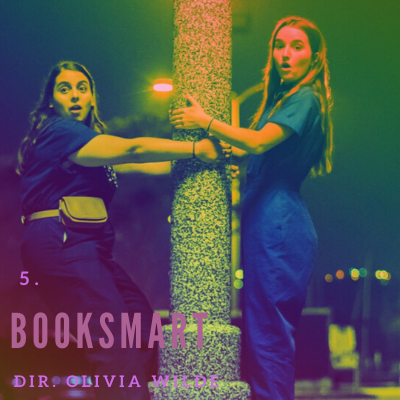
Olivia Wilde’s Booksmart feels like the modern equivalent of Clueless, a proudly feminist film that honours young women and has an exciting level of energy that powers its vibrant comedy. Beanie Feldstein and Kaitlyn Dever play the best co-lead duo of the year, bouncing off each other effortlessly and presenting one of the most honest portrayals of friendship on screen. As smile inducing as ever, Booksmart feels like the natural conclusion to a decade of female focused comedies – with films like Bridesmaids and Blockers coming before it – and leaves you feeling like the future of comedy is going to be female, and by gosh is it going to be great.
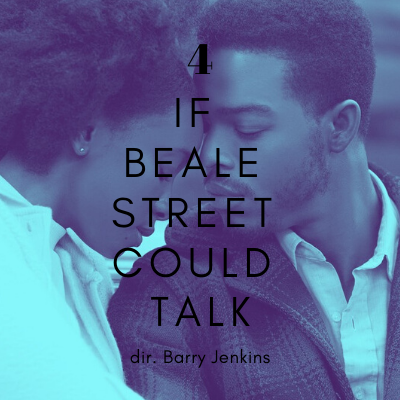
Barry Jenkins masterful Moonlight left me excited for what he would do next, but I had no idea that it would be as powerful, as moving, as loving and caring as If Beale Street Could Talk. As I said at the beginning of my review, it doesn’t matter that this film stole my heart. I didn’t need it anyhow. This is layered, knowing, lived in storytelling, encompassing decades of black history in America, decades of oppression, decades of directed hate, decades of black love rarely being shown on screen, this is a miracle of a film. Nicholas Britell’s score is the finest in years, and one that transports you to the world Barry Jenkins has so carefully created. This, and the next three films, are clear masterpieces, genuine landmarks in cinema history that deserve every accolade they get.
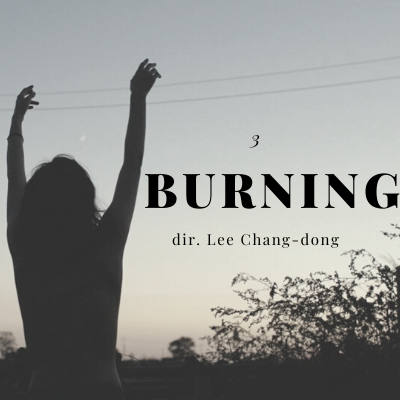
Lee Chang-dong’s adaptation of Haruki Murakami’s short story ‘Barn Burning’ is a film that works like a bundle of nerves, all connected into one, all creating their own unique experiences and idea threads. Sure, Steven Yeun’s exceptional performance is well worth singling out, but it’s lead actor Ah-in Yoo that cements this film as a masterwork. Here, he plays a loner, forever masturbating to pass the time, forever looking for his place in the world, forever lost, and yet, he’s an enigma that you can’t help but want to unfold and figure out. All the characters are like that, and Chang-dong presents them with their humanity laid bare. The visual beauty of Burning is overwhelming, with some of the finest shots of the decade being presented here. As I said in my review, there is so much more to discuss about Burning, and yet, I don’t have the skills or the intellect to do so. Yet, I’ll keep trying because Burning is one to be discussed.
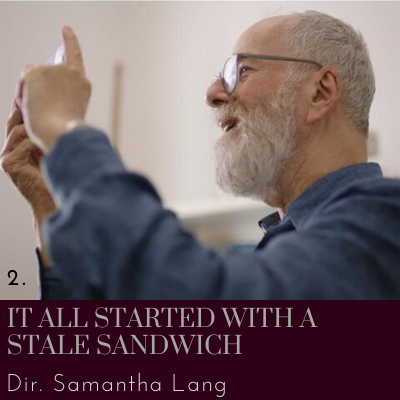


The best Australian film of the year is one that many missed out on because of the fact that it screened for all of about five minutes in theatres around the country. Which is not to say that it would have gained a wider audience if it stuck around for longer – I mean, look, I’ve been telling people about this film ever since I saw it and yet I continually get a blank look of, well, why would I watch that? But, this documentary about the Kaldor arts project, its history and impact on Australia’s art scene, is one that has stuck with me since I first saw it. I adore this film, I love its affection for art, the way that Samantha Lang explores history through unique art projects, and most importantly, the way that she celebrates art as a whole. On paper, this may sound like boring stuff, but in the moment, it’s exciting, entertaining, moving, and powerful. Repeating myself here, but in a year where Australian art was further restricted and attacked by the government, it’s with films like It All Started With a Stale Sandwich that the importance of art is reinforced, and when we celebrate people like John Kaldor and the arts project he helps foster and allow to flourish, we are reminded of what we are in jeopardy of losing. This is a celebration of art in all its facets, in all its glory, and the importance of it is felt in every frame.



And then, there’s Portrait of a Lady on Fire. Many of the themes and concepts that I’ve written about in the other 51 films on this list are revisited here – companionship, love, affection, adoration, admiration, the importance of art. Celina Sciamma’s ode to romance is such a personal film in many ways, with the two central characters embracing each other so intimately that you can’t help but feel like you’re intruding by watching them fall for each other. There’s a recontextualisation of history here, one that reminds how much of it has been written from the masculine perspective. It feels like a miracle that this film exists, it is a textbook description of what a masterpiece is. It is, quite simply, the finest film of the year. To say any more is to rob you – the viewer – of the experience of watching Portrait of a Lady on Fire, even if you’ve seen it once, twice, or three times over already.



